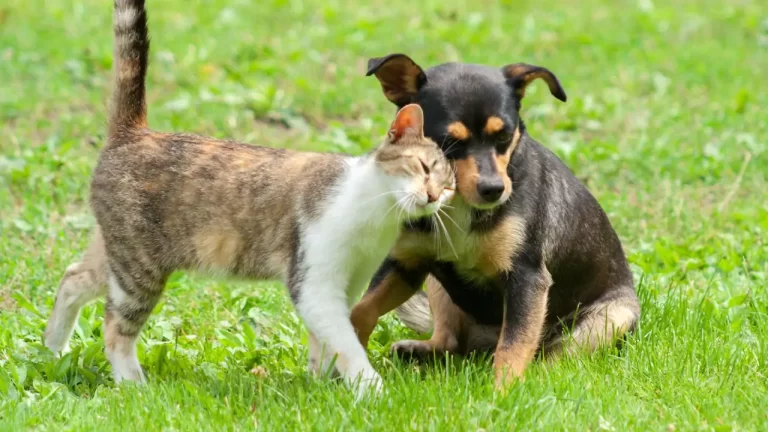No, there is no definitive scientific evidence that cats are smarter than dogs or vice versa. Animal intelligence is complex and cannot be easily ranked or compared across different species.
However, there are some interesting cognitive differences between cats and dogs that shed light on their distinct aptitudes.
Comparing the Intelligence of Cats and Dogs
Understanding animal intelligence
Intelligence is difficult to measure in animals. Traditionally, scientists have evaluated intelligence based on memory, social cognition, tool use, and problem-solving abilities. However, this may underestimate the diverse manifestations of intelligence across different species. More recent research looks at a wider range of cognitive capacities and acknowledges that there are many viable evolutionary strategies for intelligence.
Different aspects of intelligence in cats and dogs
Cats and dogs have evolved different types of intelligence. Dogs evolved outstanding social intelligence due to their hunting origins, where cooperative pack behaviors were essential for survival. Cats are more solitary hunters, so they rely more on their individual problem-solving abilities.
Studies and research on intelligence in cats and dogs
Research by neuroscientists has found that while dog brains are more driven by scent, cat brains are more dominated by sight and sound. Studies have found dogs can understand human verbal cues better while cats are more observant of human gaze and pointing. Dogs also outperform cats on social cognition tests but some studies have found cats match or surpass dogs at certain problem-solving tasks.
Are Cats Smarter Than Dogs?
Unique abilities and behaviors of cats
- Cats have an excellent spatial awareness and navigation ability. Their special memories allow them to memorize complex routes and spaces.
- Cats are skilled at observational learning. They can pick up new behaviors just from watching others complete tasks, without direct training.
- Cats are adept hunters with quick reflexes and strategic thinking skills for capturing prey. Their forebrain and sensory regions are highly developed for stalking and pouncing.
Problem-solving skills in cats
- Cats display greater independence in solving problems such as how to reach food or toys placed out of reach. Dogs look to humans for help quickly.
- Cats are able to develop creative solutions using their surroundings like knocking objects off surfaces to get owners to notice them.
- Cats can excel at learning through trial and error and understand cause-and-effect relationships in their environment.
Independent nature of cats
- Cats are not as reliant on human interaction as dogs. They can entertain themselves and be left alone for longer periods.
- Cats are adaptable and can manipulate their owners into providing food, shelter, or attention on their terms. This shows advanced cognitive abilities.
- Cats display greater curiosity and observational skills for exploring unknown spaces and objects compared to many breeds of dogs.
Are Dogs Smarter Than Cats?
Social intelligence and loyalty in dogs
- Dogs have an innate ability to read human body language, emotions, and cues to obey commands better.
- Dogs display social intelligence through their pack mentality. They understand social hierarchies and relationships between different individuals.
- Dogs exhibit greater loyalty and attachment to human owners. Their survival often depends more on human cooperation.
Trainability and obedience in dogs
- Dogs are usually more responsive to positive reinforcement training methods compared to cats.
- Dogs are skilled at understanding new words and command relatively quickly with repetition and positive rewards.
- Working and service dogs demonstrate high trainability to perform complex tasks like herding livestock, guiding the blind, or sniffing out drugs.
Dogs’ ability to understand human emotions
- Dogs can discriminate between human facial expressions and are attentive to emotional cues in a person’s voice or posture.
- Dogs comfort distressed human companions and often respond to crying, aggression, or laughter in appropriate ways.
- Dogs display empathy and emotional intelligence in their relationships with humans that may surpass cats.
The Truth About Cat and Dog Intelligence
The importance of individual differences
While cats and dogs have some cognitive differences on average, there is still tremendous individual variation within each species. Not all cats nor all dogs conform perfectly to the stereotype. Upbringing, training, breeding, and environment all influence intelligence.
Intelligence vs. trainability
Dog intelligence is easier to measure because they are more responsive to human training and direct commands. However, trainability does not necessarily reflect all aspects of intelligence. Cat intelligence may be more difficult to elicit and study empirically.
Appreciating the unique qualities of both cats and dogs
Rather than ranking one species above the other, it is important to appreciate the distinctive evolved intelligence of both cats and dogs. Each has strengths in different types of mental capabilities. Accepting and understanding these differences allows owners to bring out the best in their pets.







